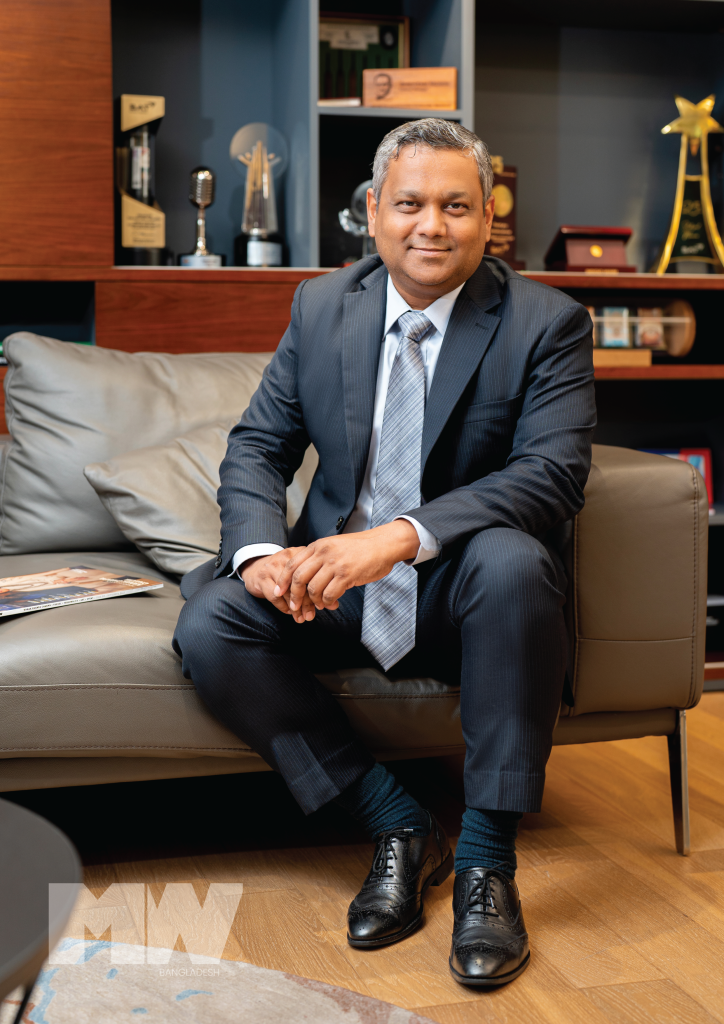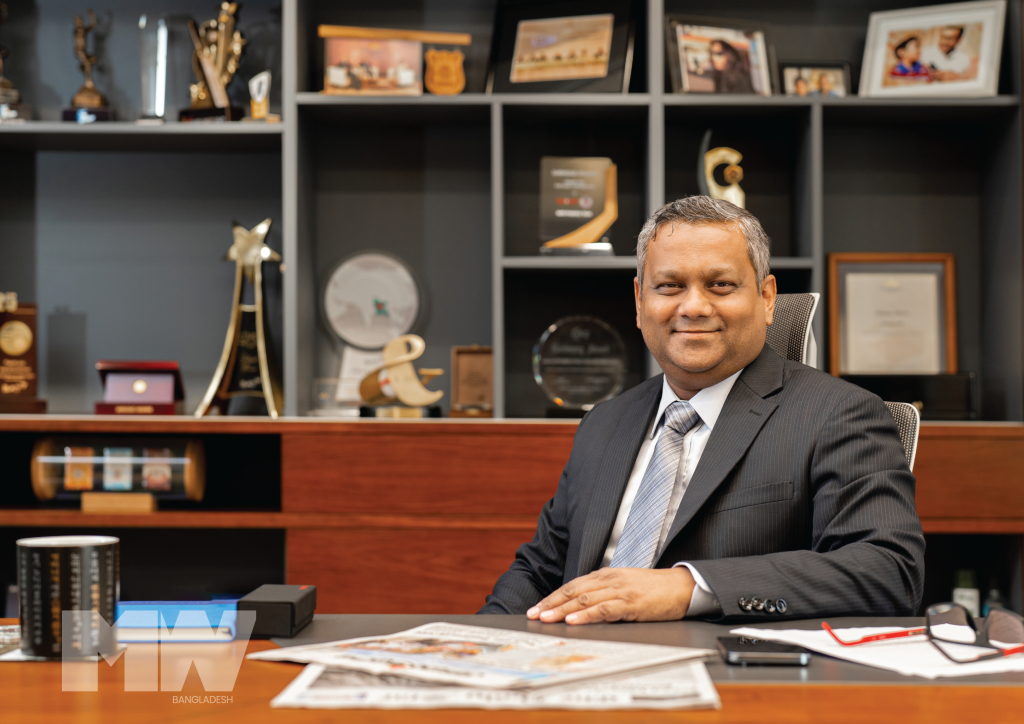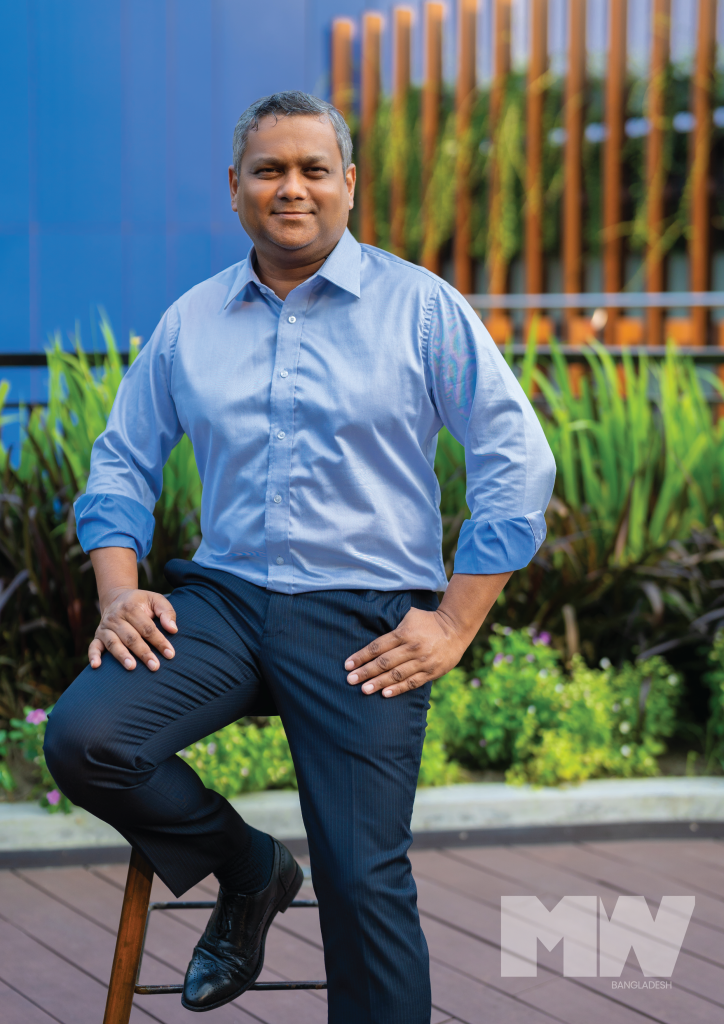The Managing Director of BAT Bangladesh talks leadership and vision
By Sabrina Fatma Ahmad
Shehzad Munim is the Managing Director and Chief Executive Officer of British American Tobacco Bangladesh Co. Ltd. (BATB). He is the first Bangladeshi to hold this position in the history of BATB, which dates back to over 100 years. The IBA graduate began his BATB journey as a Territory Officer in 1997, and has worked in various marketing roles within BATB and abroad, including New Zealand, Australia, and South Asia. This month, he spoke to MW over email about his journey thus far.
As the first Bangladeshi to hold the position of MD of BAT Bangladesh, could you share with us your experience of leading such a large and diverse organization?
The journey has been filled with intense learning, curiosity, opportunities, and challenges. Every challenge brought numerous learning opportunities for my career. Still, out of these, a few challenges and opportunities profoundly impacted my life and career development.
The first of these experiences took place during my initial posting as a Territory Officer at BAT Bangladesh. It proved to be one of the most valuable learning experiences in my career. Initially tasked with training field forces of my distributor using the “Best Practice Manual,” I quickly realized that these sales representatives already possessed extensive knowledge, having worked with the company for the past 10-25 years. In response, I suggested we learn together by turning the training session into a two-way discussion. This change allowed the field forces to explore the world-class sales and distribution theories, while I had the opportunity to gain valuable insights into their extensive market experience. This incident taught me not only the significance of teamwork but also how to lead a group of seasoned and experienced members by actively listening to them and motivating them accordingly.
After my stint in Sylhet, I moved to the Head Office as the Brand Officer. There, I noticed the brand had a very small budget, leading to a low workload. Seeking more significant challenges, I prepared a presentation for the department head, explaining why increasing the brand’s investment was crucial. He liked the presentation and gave me two options: to work closely with him or take on the role of Brand Manager. Due to my strong ambition, I chose the latter. My first year as Brand Manager was incredibly challenging and pushed me to my limits. I barely made it through, but it taught me valuable lessons on self-assessment, taking calculated risks, and believing in my abilities.
The third significant challenge and opportunity emerged during my tenure as the Group Brand Manager in New Zealand. Initially enthusiastic and curious about this opportunity, I soon found myself contributing valuable insights that led to significant changes in New Zealand’s market approach. I discovered opportunities for learning, while simultaneously sharing certain business practices from Bangladesh with them. This experience not only bolstered my confidence but also reinforced the idea that as Bangladeshis, we are just as capable as anyone else on the global stage. It had a profoundly positive impact on both my self-assurance and my career.

How did your overseas work experiences shape your perspective and approach to business and leadership?
My journey at BAT has been truly remarkable, offering me numerous learning opportunities in diverse global markets. The mantra is to respect diversity and local knowledge. One size doesn’t fill all aspects of consumer demand. As a leader, the job is to bring out the best in teams. If we don’t understand the culture and values, we will never inspire the team.
You have been described as a courageous and resilient leader who has overcome many obstacles and setbacks in your journey. What are some of the lessons that you learned from your failures?
The key to finding success from failure is to find the root cause of the failure. I have seen that most of the time, the cause of failure is within the team. Lack of teamwork and coordination is one of the common reasons.
Acknowledging failures and setbacks is part of life, and it will help you to push yourself and explore new avenues to become successful. Failures have provided me the opportunity to gain experience and knowledge that helped me to shape my career. I am thankful to my team. They are my strength, and I believe they have made me who I am today.
How do you cope with stress and uncertainty?
Uncertainty is a part of life. That’s what makes life interesting. I believe if we all knew the end result, we would miss out on the thrill of navigating through life and enjoying the moments. We live in a high-paced world, and stress will exist, but it is important to have the grit and will to conquer the day and the challenges as they come your way. For me, my family’s support played a vital role, especially my wife. Her patience and support have truly helped me to navigate through uncertain times. We are a good team! As far as stress is concerned, I truly believe that it is very important to have a passion and nurture it. My passion is cricket, and I proactively dedicate my Fridays to the sport and my son. All my stress diminishes when I am in the field with him.

Who are some of the people that inspire you?
My line manager was a Malaysian when I joined as Group Brand Manager in New Zealand. One day, in a casual conversation, I learned that he dreamed of becoming the Managing Director of BAT Malaysia. His ambition instantly inspired me and led me to believe that one day I could also lead my organization in my own country as the first local managing director and contribute to the growth of the country’s economy and bring positive change in people’s lives.
What’s the best advice you’ve received?
The Managing Director of BAT New Zealand gave me a piece of invaluable advice about life and work that I still recall: “If you don’t work for a year, don’t do anything other than doing the basics; the biggest loser will be you and not the company! The company will operate, but you will miss out on your valuable learning experience.” Now I would like to say: Earn to learn. Try to focus on learning opportunities rather than money; money will follow you along the way in gaining experience and expertise.
What are some of the opportunities and challenges that Bangladesh faces in the global market? How do you see the future of Bangladesh’s economy and society?
Bangladesh is a land of immense possibilities and a nation full of indomitable spirits. Recently, we have witnessed the country achieving milestones that seemed unattainable a few years ago. We have successfully translated the dream of Padma Bridge into reality with our own resources. When we first came to know about the idea of Digital Bangladesh, it also seemed impossible to many. But we have already achieved Digital Bangladesh vision, and now we are moving at an incredible pace to realize our vision of becoming Smart Bangladesh.

At the same time, I want to highlight some areas of improvement, or you can say challenges, which Bangladesh should focus on the journey forward. Although we have seen significant breakthroughs in infrastructure development, some prevalent challenges in areas such as transportation and clean energy need to be resolved. Currently, we are dependent on fossil fuels. For example, the electricity we generate from gas or coal is unsustainable. When we are eyeing achieving a sustainable future, our focus needs to be shifted towards renewable energy. Besides, steps need to be simplified so that we can aim for more foreign investment. We need to upscale facilities for our labor force. They are winning respect locally and globally; necessary skill upliftment will only add value. They are sent to different countries, and they pick up the language in six months. Imagine the possibilities: If they are given the right training and education, they will be our true national asset.
On the other hand, if you look at the big picture, Bangladeshi youths are pulling up tremendous challenges in different fields and making their marks on the global stage. They will guide the nation to realize its vision of becoming a “Smart Bangladesh.” We need to invest in the youth; they are the future! The global arena is changing; we see artificial intelligence (AI) is now taking over. If we don’t prepare our youth for cutting-edge technological tools, such as big data, bioinformatics, machine learning, etc it will be tough to cope with the future. Bangladesh is currently in such a momentum that enjoys a demographic dividend and will keep on doing so for the next couple of decades.














